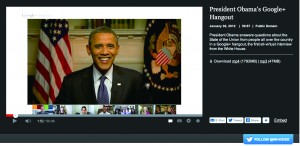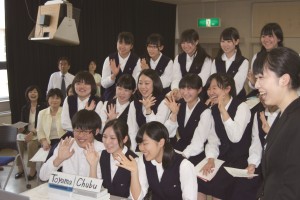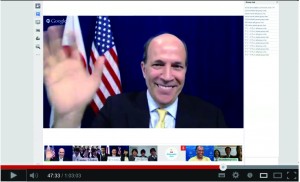Imagine this: U.S. Ambassador to Japan John V. Roos is sitting under a bright spotlight in a studio having an animated conversation with a computer screen filled with the smiling faces of young people across Japan. What’s going on here? Isn’t the Ambassador too busy meeting with high-level government officials and giving speeches at illustrious events to be video-chatting with teenagers and young professionals? Not all the time. Today he’s making time to interact with the youth of Japan in the first-ever “Ask the Ambassador” Town Hall Meeting.

The United States government has started using the interactive, online platform “Google+ Hangout” as a new way to connect with the public both at home and around the world. President Barack Obama recently used the tool in a “Fireside Hangout” to connect with a group of people across the country who are active online to discuss the policies and proposals laid out in his State of the Union address a few days earlier. In fact, the White House has hosted hangouts about everything from healthy families to human trafficking. Secretary of State John Kerry also participated in a live conversation with American citizens from across the country in a Google+ “Hangout at State” that provided an opportunity for the Secretary to discuss the impact that the U.S.’s involvement abroad has on the American people at home.
Ever since Ambassador Roos arrived in Japan in 2009, he has valued real dialogue with Japanese youth and visited numerous local university campuses to hold discussions with students. He is also very active in social media and has over 60,000 followers on Twitter. On May 22, the U.S. Embassy in Tokyo arranged for the Ambassador to engage with Japanese youth through a Google+ Hangout titled “Ask the Ambassador,” in which he held a real-time, interactive dialogue with students and young adults in Okinawa, Toyama, Shibuya, and Roppongi.The Ambassador was excited to answer questions about the U.S.–Japan security alliance, youth exchange, leadership, and more in his first-ever Google+ Hangout.
On the big day, the participants were standing by with anticipation, eager to speak with the Ambassador using this new mode of cross-cultural communication. The Kitanippon Shimbun, a local newspaper in Toyama, reported on the students’ preparations for the event, quoting Toyama Chubu High School third-year student Airi Yamabuchi as saying, “I want to ask a lot of questions so I can grow from this experience.”
Ambassador Roos got the conversation started by responding to a question from Shibuya Kyoiku Gakuen, Shibuya Senior High School on his role as U.S. Ambassador to Japan: “The role of an Ambassador is the President’s representative in the country to deal with everything that the President of the United States would be doing and working with this country on…. I’ve met with people throughout Japan because I believe that you are the future of the relationship between our two countries and I think it’s incredibly important to do things such as we’re doing right now on Google Hangout, so that you can better understand my country. Similarly I’d like our people to better understand Japan, because that’s the future of the relationship.”
 The Ambassador spoke in detail about the TOMODACHI Initiative, a public-private partnership that supports Japan’s recovery from the Great East Japan Earthquake and invests in the next generation of Japanese and Americans. When a student at Toyama Chubu High School asked him about the TOMODACHI Initiative’s efforts to help young people develop into world leaders, he said: “I think we’re looking to your generation in connecting up with our generation to really develop the skills necessary to solve the world’s problems. I’m very optimistic on what you’re going to accomplish out of this. In my view, the sky is the limit.”
The Ambassador spoke in detail about the TOMODACHI Initiative, a public-private partnership that supports Japan’s recovery from the Great East Japan Earthquake and invests in the next generation of Japanese and Americans. When a student at Toyama Chubu High School asked him about the TOMODACHI Initiative’s efforts to help young people develop into world leaders, he said: “I think we’re looking to your generation in connecting up with our generation to really develop the skills necessary to solve the world’s problems. I’m very optimistic on what you’re going to accomplish out of this. In my view, the sky is the limit.”
The program also provided an opportunity for young people in Okinawa to discuss the issue of the U.S. military bases in Okinawa with a representative of the U.S. government. The Ambassador didn’t hesitate to speak candidly when a student at Okinawa Christian University asked him what he thought about the reaction of Okinawan people to the U.S. military presence in Okinawa: “I totally understand the feelings of the people of Okinawa and I know there are different feelings, by the way. Some people are very supportive of the bases, others are not, but I think we all agree that it’s very important to reduce the impact of the bases. The security alliance between the United States and Japan is so important in so many different ways, but at the highest level it is this alliance that has been primarily responsible for keeping peace and security in this region of the world for over 50 years.
In addition to the students, three young professionals at Roppongi Academy Hills also participated in the discussion. One of them asked Ambassador Roos whether the Japanese approach to leadership of building consensus can work in multinational teams. “People can be leaders through listening, building consensus, showing other parts of their personality,” replied the Ambassador. “There’s not just one way of becoming a leader and I think that what you’re referring to as the more typical Japanese leadership qualities of listening and building consensus is very important and can be very effective on the global scene.”

In addition to discussing serious issues like these, the Ambassador also answered some fun questions, including this one selected from those submitted by his Twitter followers: “What songs do you like to sing at karaoke?” He confessed that he’s an “awful” singer, but loves to sing songs from the musical “Bye Bye Birdie.”
Although the questions covered a wide range of topics, there was a recurring theme to the conversation. The Ambassador repeatedly encouraged the young people of Japan to take advantage of opportunities to study, live, and work abroad, particularly in the United States. “You really get a deep appreciation for a country when you live there. There’s just no substitute for it,” he said. “The world is an incredible place and if you have an opportunity to live somewhere like I have lived in Japan for the last four years, you recognize how much you miss out if you don’t take advantage of these kinds of opportunities.”
In an article titled “Tell us, Ambassador Roos!” the Kitanippon Shimbun quoted Toyama Chubu High School second-year student Mizuki Tanaka as saying: “I was able to have a once in a lifetime experience.” Chizuko Yuguchi, the English teacher that leads the English conversation club at the school, also expressed her appreciation to the U.S. Embassy for reaching out from Tokyo all the way to students in Toyama Prefecture. The club helps students to develop their English conversation skills by holding debates in English. “Our ultimate goal is to link our activities to real communication like this, so this opportunity was really a culmination of our efforts,” she said. “The students were deeply inspired by the Town Hall Meeting itself and by everyone who was involved in the program. I think this could become a major turning point in the lives of these young people.”
When a student from Shibuya Kyoiku Gakuen asked him the ultimate question for ambitious Japanese youths: “In order to make this world better, what should we do as Japanese?” the Ambassador said: “Let me tell you something. Japan is an incredible country. I’ve now lived here for four years and my wife has along with me. We love this country. It’s an amazing country. It’s an educated country. It’s a wealthy country. It’s a country with incredible culture and history. The whole world has so much to learn from you and the people of Japan. Let’s not have them learn it just through television or through the Internet. You need to be ambassadors for your country and you need to be all over the world.” Whether it’s at formal engagements, campus visits, or Google Hangouts, Ambassador Roos never passes up an opportunity to express his deep admiration for the nation of Japan and his high expectations for the future of its young people.
Watch a video of the Google Hangout with Ambassador Roos:







COMMENTS0
LEAVE A COMMENT
TOP